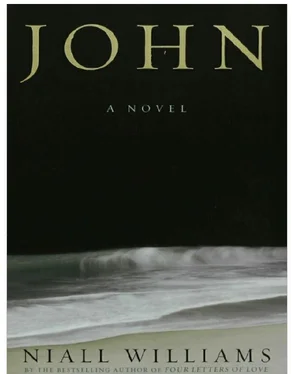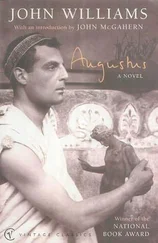At the cave entrance they stop.
'You must rest now, Papias,' Ioseph says. 'We thank God that you have come back to us.'
'Back? I have not been gone.'
The elders exchange looks, some lower their eyes to the stone path.
'Before the dawn bell you were announced dead,' John says.
Papias looks at him. 'Master, I was not dead.'
None speak. John holds on to the youth's hands, a frail bridge-way, windblown. The illumination of the night is about the Apostle still. We are nothing lest we love. He finds himself welling like a spring struck. His chin trembles with emotion. He fears he may weep with gratitude, may seem the oldest of old men to the elders and buckle with love. It keeps coursing through him. The poor daylight, the sealight, the sounds and smells carried on the wind, these, the disciples who have followed him in banishment all these years, the loyal youth: all are touched with the same blessing. He cannot think of one without feeling love. It is as if he has been rescued and returned to himself, to a time long ago when he felt so. This is his understanding of it now. It is love that informs all. Nor is this love a thing soft or immature like a new bud, but rather that which comes coursing through the vine itself and makes it strong, durable, pliable, makes it spread to encompass more and more ground, cling to the wall, bear fruit. He has been weak, and foolish, and forgotten love, but no more.
'Come. Come all of you. Come inside,' the Apostle says. His blind head at an upward tilt, he releases Papias and waves both hands. 'Come. All. Be with me.'
When they are entered and sit around on rush mats and stools, and Papias has been given a lambswool blanket for his shoulders, the Apostle speaks to them. He speaks as he has not in a long time, and from his first words all of the elders feel a shiver of knowledge, understanding the words he speaks will outlive time.
'Beloved,' he says, 'we must believe not every spirit, but try all spirits whether they are of God, because many false prophets are gone out into the world.' He touches his tongue to his lips, raises his voice louder and stronger still.
'Hereby know ye the spirit of God: every spirit that confesses that Jesus Christ is come in the flesh is of God, and every spirit that confesses not that Jesus Christ is come in the flesh is not of God; and this is that spirit of Antichrist, whereof ye have heard that it should come; and even now already is it in the world.'
None speak. The elders and the youth look at the blind apostle as though at a column of light.
'But ye,' John says, 'ye are of God, my children, and have overcome them, because greater is he that is in you than he that is the world.
'They are of the world; therefore speak they of the world, and the world heareth them.
'We are of God: he that knoweth God heareth us; he that is not of God heareth not us.
'Hereby know we the spirit of truth, and the spirit of error.'
He pauses. The phrases are like platforms in his mind, the construction building one upon the next, rising as steps he discovers just as he arrives at each one. It proceeds with perfect logic, as if out of a natural pre-existent order. The words are there just before he needs to find them. He raises his head, his whitened eyes, his arms he holds outwards.
'Beloved, let us love one another: for love is of God; and everyone that loveth is born of God, and knoweth God.
'He that loveth not, knoweth not God.' Again he pauses, as if he is in flight and discovers a higher plane of purer air, then flies up into it. He says aloud the four words that seem carved on the invisible: 'For God is love.'
His speech has the quality of truth, beyond dispute, and the disciples need no persuasion. Some nod silently, others stare as if at a marvel. The Apostle draws to him his arms, presses together his hands. None have heard him speak so before, for this is not the telling of the acts of Jesus, there is no narrative. This is not the preaching Ioseph heard from the Apostle many times when they wandered in the dusted lands of Bithynia or Troas or the stony fields of Thessalonica. This is other. This seems a pure distillation.
'Beloved,'John repeats, 'he that loveth not, knoweth not God: for God is love.
'In this was manifested the love of God towards us, because that God sent his only begotten son into the world, that we might live through him.
'Herein is love, not that we loved God, but that he loved us, and sent his son to be the propitiation for our sins.'
The cave catches the wind; the air sings like the sea. Light and cloud-shadow cross. The old apostle raises his hands a last time.
'Beloved,' he says, 'if God so loved us, we ought also to love one another.
'No man had seen God at any time. But if we love one another, God dwells in us and his love is perfected in us.
'Let us pray that it will be so.'
John bows his head, the others likewise. In the cave on Patmos they kneel in the darkness, flooded with light.
Now is the moment.
Matthias stands on the seashore, before him a great mound of the dead seabirds that Auster and Linus have gathered and now set alight. Lamp oil takes flame, sea faggots, flotsam of storm wrack, timbering. Black smoke in a banner unfurls.
Now is the moment. I will win to me no more but Papias. He alone of the others would be of value. Testament. Eyewitness. My own Lazarus. How quickly they carried him away! It will matter not. I will confront him: You were dead; I went after and brought you back. How deny that? Arise and follow.
The bird fire burns poorly. Smoke smudge thickens against the daylight. The grey sea twists as though in chains. In the near distance some few fishers are about, starting late because of the storm, hoping to bring home a heavy catch of fish foolish to seek sanctuary in the shallow waters. The boats cut across the waves on quick wind till the nets grow heavy. Auster and Linus stand by the pyre. They are in open-eyed amazement still at the discovery of the seabirds after Matthias had told of them in his struggle with the devil. When Linus saw them, he vomited, Auster wanted to clap his hands. The birds were a brilliant display, all the more awesome for the substantial weight of each as Linus and Auster dragged them over the sand. What power it took to strike them from the sky! What flash of mind forked into the night to plunge them headlong! The two disciples watch the smoke rise and curve in upon itself and uncoil, caught by the wind. Matthias walks away down the stony shore, stands.
The storm will have passed by this evening. At daybreak we will leave.
Lemuel comes with the news. The Apostle has announced the community will take supper together. There will be a communion before sunset. Matthias returns to his dwelling, his eye pulsing with pain. He removes the poultice, palms water on to his face from a bowl. The hour is near. His heart is quickened at the thought. He palms the water a second time, touches gingerly the throbbing, winces. Still, the wound has its worth. He sits to consider how things must proceed. After a time he sends Auster and Linus to tell the others to come to his dwelling before the supper.
The Apostle is renewed. He has a vigour and resolve unfamiliar but to Ioseph, who has known him the longest. He sits by Papias, who tells him, 'You need not care for me, Master. I recover quickly.'
'Call me not "Master", call me Brother, or call my name, John.'
'I cannot, Master.'
'My name is John.'
Papias lowers his brow, his complexion waxy and pale, his eyes glossed. 'I must call you "Master",' he says, then adds, 'and Master, I must confess.'
'And you will be forgiven.' John bows his head and Papias tells him in whisper the story of the woman Marina and her children and the vanity of thinking he could bring them back from the dead. He confesses to temptation and concealment, to the potent seduction of power. His face reddens as before a fire. His voice drops further so the words are smallest sounds. John listens, holds out his right hand and prays. 'Walk in the light,' he says.
Читать дальше










